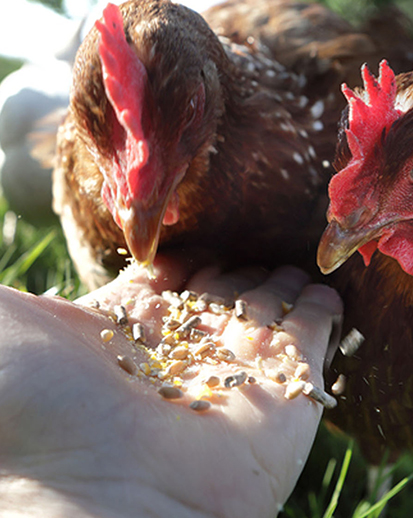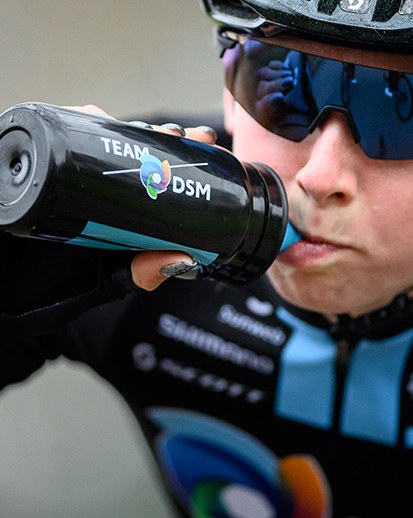Total remuneration of the Managing Board 2020
Introduction
Actual remuneration for 2020 is fully aligned with the remuneration policy, which complies with EU requirements and Dutch legislation.
Feike Sijbesma handed over his responsibilities as CEO and Chairman of the Managing Board / Executive Committee Koninklijke DSM N.V. and as member of the Managing Board, to his successors, Geraldine Matchett and Dimitri de Vreeze, on 15 February 2020. In view of a proper handover to the Co-CEOs appointed with effect from that date, and also in order to finish certain projects, Feike Sijbesma remained employed until 1 May 2020, observing the terms and conditions of the employment agreement. As a result of this leadership transition, the Managing Board of DSM went down from three to two members, as both Geraldine Matchett and Dimitri de Vreeze have been members of the Managing Board in prior years.
This Remuneration report provides an overview of the 2020 remuneration of the Co-CEOs, Geraldine Matchett and Dimitri de Vreeze. Note that their remuneration delivered prior to 15 February 2020 is based on the terms and conditions applicable to Managing Board members. Feike Sijbesma’s remuneration in 2020 is included in a separate paragraph.
Base salary
Upon their appointment, the annual base salary of the Co-CEOs was set at €925,000, below the base salary of their predecessor of €960,000. While the policy allows an annual review of base salaries, the Supervisory Board refrained from an adjustment in 2020 due to the uncertainties associated with the development of the COVID-19 pandemic at that time. Note that for our global workforce, salary adjustments have been implemented, following our policies and practices.
in € |
|
15 February 2020 |
|
1 July 2019 |
|
|
|
|
|
Geraldine Matchett |
|
925,000 |
|
637,500 |
Dimitri de Vreeze |
|
925,000 |
|
637,500 |
Short-Term Incentive (STI)
This report includes the STI achievement for 2020, payable in April 2021, and based on base salary paid in 2020. Targets were set ahead of the STI cycle, in accordance with the remuneration policy and budgeted results for the current year, ensuring that achievement would be challenging. A scenario analysis was conducted prior to final approval of the targets by the Supervisory Board. The targets for the 2020 scheme were set prior the global pandemic and have not been adjusted in view of the pandemic’s adverse effects. Focus was kept on finding ways to overcome these challenges and to continue the pursuit of DSM’s strategic objectives.
Definitions of goals set for 2020 STI (total at-target weight, 50% of annual base salary):
- Adjusted EBITDA (weighting 12.5%): sum of the operating profit plus depreciation and amortization, adjusted for material items of profit/loss following acquisitions/divestments, restructurings and other circumstances deemed necessary
- Adjusted net operating free cash flow (10%): cash flow from operating activities, corrected for the cash flow of the APM adjustments, minus the cash flow of Capital expenditures and drawing rights
- Net sales growth (2.5%): net organic sales growth
- Brighter Living Solutions (5%): products and services that, considering the whole product life cycle, offer an environmental benefit (ECO+) and/or social benefit (People+) compared to mainstream reference solutions. DSM uses a standard approach to measure the impact of portfolio changes (for ECO+ the Eco Life Cycle Assessment, using the WBCSD Chemical sector approach, whereas People+ qualifications are made using DSM’s People LCA method)
- Safety (5%): based on Frequency Index for recordable injuries
- Employee Engagement (5%): based on the High-Performance Norm in industry
- Individual goals (10%): in 2020 the Managing Board / Executive Committee shared two team targets
The company does not disclose the exact actual targets, as these qualify as commercially sensitive information, though the targets set are fully in line with the published strategic, financial and sustainability goals of the company. The overall average achievement of the Managing Board members for performance year 2020 amounts to 61.3% (2019: 54%) of annual base salary. KPMG performs procedures over the realization of financial targets and the validation process of non-financial targets.
Within DSM’s STI scheme, pay-out brackets are defined, taking into account the nature of the goal. Depending on the goal, the number of brackets varies from 5 to 9. The lowest bracket represents a target realization of 0%, the highest of 200% of the at target weighting of the respective goal. Goals, targets and pay-out schedules have been defined at the beginning of the year and have not been adjusted in view of the COVID-19 pandemic.
The following table provides an overview of the realization of the 2020 STI targets.
|
|
Weight |
|
To be achieved in % of target defined |
|
Performance bracket achieved |
|
Pay-out in % of base salary |
||||
|
|
|
Minimum |
|
Target |
|
Maximum |
|
|
|||
|
|
|
|
|
|
|
|
|
|
|
|
|
Adjusted EBITDA |
|
12.5% |
|
96.0% |
|
100.0% |
|
103.0% |
|
0.0% |
|
0.0% |
Adjusted net operating free cash flow |
|
10.0% |
|
87.5% |
|
100.0% |
|
109.0% |
|
200.0% |
|
20.0% |
Net sales growth |
|
2.5% |
|
50.0% |
|
100.0% |
|
150.0% |
|
0.0% |
|
0.0% |
Brighter Living Solutions |
|
5.0% |
|
92.0% |
|
100.0% |
|
110.0% |
|
100.0% |
|
5.0% |
Safety |
|
5.0% |
|
100.0% |
|
100.0% |
|
110.0% |
|
200.0% |
|
10.0% |
Employee Engagement |
|
5.0% |
|
94.0% |
|
100.0% |
|
106.0% |
|
125.0% |
|
6.3% |
Individual goals |
|
10.0% |
|
0.0% |
|
100.0% |
|
200.0% |
|
200.0% |
|
20.0% |
DSM’s businesses were impacted by the circumstances that characterized 2020. Overall, Nutrition performed well, whereas Materials was to a considerable degree impacted by the pandemic, though picking up momentum as of September. The resulting Adjusted EBITDA was below the threshold (defined as 96% of targeted Adjusted EBITDA) and therefore the target does not deliver a pay-out. This is also true for the target regarding the Net sales growth. A strong focus on cash management resulted in a maximum achievement of the Adjusted net operating free cash flow target.
The Brighter Living Solutions target was achieved. DSM demonstrated a very strong Safety performance resulting in maximum achievement of the respective target. Employee Engagement went up, resulting in an overachievement of the target, a confirmation of our focus on safety, health and well-being of our employees.
The combined realization resulted in a 2020 STI pay-out as included in the overview below.
in € |
|
2020 |
|
2019 |
|
|
|
|
|
Geraldine Matchett |
|
545,249 |
|
326,970 |
Dimitri de Vreeze |
|
545,249 |
|
342,720 |
Short-Term Incentive deferral & matching (STI)
In addition to the mandatory deferral (25% of STI achieved), the Managing Board members decided to convert an additional 25% (maximum possible) of the STI paid in 2020 into shares. This means that the Co-CEOs converted 50% of their STI into this long-term incentive, demonstrating their trust in the company strategy and their focus on the long term. A 1:1 grant of PSUs was implemented, as included in the following table. The 2020 grant was based on the STI achieved over 2019 and therefore on the 2019 terms and conditions as member of the Managing Board.
Number of PSUs |
|
2020 grant |
|
2019 grant |
|
|
|
|
|
Geraldine Matchett |
|
1,558 |
|
2,552 |
Dimitri de Vreeze |
|
1,632 |
|
2,474 |
Long-Term Incentive (LTI)
2020 and 2021 grant
In 2020, 12,500 Performance Shares Units (PSUs) were granted to each of the Co-CEOs (2019: 12,500). The grant is based on the annual base salary applicable on the grant date and the average share price in January of the year of grant. The 2021 grant equals 10,000 PSUs for each Co-CEO. Any grant equals the maximum number of PSUs that may vest. The 2020 and 2021 grants are based on the terms and conditions as Co-CEO, whereas the 2019 grant was based on the 2019 remuneration as member of the Managing Board. The fact that nevertheless the number of PSUs granted in 2020 and 2021 is equal or lower compared to the 2019 grant is driven by the share price appreciation.
Goal-setting and vesting scheme
Targets were set ahead of the LTI cycle, in accordance with the remuneration policy, ensuring that achievement of threshold, target or maximum vesting is challenging. A scenario analysis was conducted.
Definition of goals set for LTI grants:
- Total Shareholder Return — TSR (weighting 25%): sum of capital gain and dividends paid, representing the total return to shareholders; the relative ranking (within the peer group) reflects the market perception of overall performance relative to our peers
- Return on Capital Employed — ROCE (25%): operating profit as percentage of weighted average capital employed
- Energy Efficiency Improvement — EEI (25%): the reduction of the amount of energy used per unit product (known as energy efficiency) on a three-year rolling average basis
- Greenhouse Gas Emissions — GHGE (25%): as of the 2019 grant: absolute reduction of greenhouse gas emissions in kilotons over performance; the target up to and including the 2018 grant, is based on the reduction of greenhouse gas emissions per unit of product
Vesting 2017 grant
The performance period of the PSUs granted in 2017 was completed by year-end 2019: the actual vesting was on 31 March 2020. This concerns the PSUs granted under the Long-Term Incentive plan as well as the PSUs granted under the STI deferral & matching plan. The following vesting schemes applied. The performance bracket highlighted, reflects the pay-out bracket that has been achieved related to the respective goal.
TSR1 |
|
ROCE |
|
EEI |
|
GHGE Efficiency improvement |
||||||||||||||
Rank |
|
% of PSUs granted that vest2 |
|
ROCE ultimo performance period |
|
% of PSUs granted that vest2 |
|
EEI% (over a 3-year period) |
|
% of PSUs granted that vest2 |
|
GHGE Efficiency improvement % (over a 3-year period) |
|
% of PSUs granted that vest2 |
||||||
|
|
|
|
|
|
|
|
|
|
|
|
|
|
|
||||||
1 |
|
100 |
|
≥14.0 |
|
100 |
|
≥4.00 |
|
100 |
|
≥8.75 |
|
100 |
||||||
2 |
|
97 |
|
13.5 – <14.0 |
|
83 |
|
3.25 – <4.00 |
|
83 |
|
8.25 – <8.75 |
|
83 |
||||||
3 |
|
93 |
|
12.5 – <13.5 |
|
67 |
|
2.75 – <3.25 |
|
67 |
|
7.75 – <8.25 |
|
67 |
||||||
4 |
|
87 |
|
12.0 – <12.5 |
|
50 |
|
2.50 – <2.75 |
|
50 |
|
7.25 – <7.75 |
|
50 |
||||||
5 |
|
80 |
|
11.5 – <12.0 |
|
33 |
|
2.25 – <2.50 |
|
33 |
|
6.75 – <7.25 |
|
33 |
||||||
6 |
|
73 |
|
<11.5 |
|
- |
|
2.00 – <2.25 |
|
17 |
|
6.25 – <6.75 |
|
17 |
||||||
7 |
|
67 |
|
|
|
|
|
<2.00 |
|
- |
|
<6.25 |
|
- |
||||||
8 |
|
50 |
|
|
|
|
|
|
|
|
|
|
|
|
||||||
9 |
|
33 |
|
|
|
|
|
|
|
|
|
|
|
|
||||||
10–15 |
|
- |
|
|
|
|
|
|
|
|
|
|
|
|
||||||
|
||||||||||||||||||||
A strong share price appreciation resulted in the second rank on the relative Total Shareholder Return target. The ROCE was within the bracket set around the target and therefore resulted in 67% of the grant related to this target to vest (the grant consists of the maximum number that may vest). Both sustainability goals have been outperformed, resulting in a maximum contribution to the overall vesting result, demonstrating DSM’s commitment to Sustainability as a business driver. The table hereafter provides an overview of the number of PSUs granted in 2017 that vested (i.e. converted to unconditional shares) in 2020. In total 90.8% of the PSUs granted in 2017 did vest (in 2019 100% of the PSU’s granted in 2016 did vest). Since the number of PSUs granted equals the maximum number to vest, the vesting equals 136.25% of the targeted grant.
Numbers of PSUs vested1 |
|
LTI |
|
STI deferral & matching scheme |
||||
|
|
|
|
|
||||
Geraldine Matchett |
|
14,074 |
|
3,592 |
||||
Dimitri de Vreeze |
|
14,074 |
|
3,592 |
||||
|
||||||||
Pension and other benefits
Participation in the basic pension plan provided by the Dutch pension fund (Stichting Pensioenfonds DSM Nederland — PDN) to all DSM employees in the Netherlands is mandatory for the Managing Board. Regarding pensionable salary not covered by the basic pension plan, a company-paid pension contribution as determined by the Supervisory Board applies. This contribution can be used by Managing Board members to participate in the so-called Net Pension Plan under conditions applicable to all participating DSM employees. The company provides accident insurance cover, a company car, and a fixed representation allowance in line with market practice.
Total remuneration
Actual remuneration for 2020 is fully aligned with the remuneration policy. An in-depth benchmark conducted in preparation of the latest review of the Remuneration Policy Managing Board Koninklijke DSM N.V. demonstrated that DSM lagged behind the median of the labor market peer group, also considering the pay-out scenarios of the incentive schemes. A further, more recent review, shows that the current total remuneration of DSM’s Co-CEOs is the lowest within our (Dutch/European) peer group. The difference would become even bigger if the benchmark comparison were to be made with a global peer group (i.e., including US-based peers).
The following table provides an overview of the total remuneration expense for the company in relation to the Managing Board in accordance with IFRS rules (these costs are not necessarily equal to compensation paid or the cash out for DSM).
|
|
Fixed |
|
Variable compensation |
|
Fixed |
|
Fixed |
|
Total |
|
Proportion fixed / variable remuneration |
||||||||||||||||||||||||
|
|
Base salary / fees |
|
Short-term incentive |
|
Share-based compensation1 |
|
Pension expenditure |
|
Other items2 |
|
|
||||||||||||||||||||||||
x € thousand |
|
2020 |
|
2019 |
|
20203 |
|
20193 |
|
2020 |
|
2019 |
|
2020 |
|
2019 |
|
2020 |
|
2019 |
|
2020 |
|
2019 |
|
2020 |
|
2019 |
||||||||
|
|
|
|
|
|
|
|
|
|
|
|
|
|
|
|
|
|
|
|
|
|
|
|
|
|
|
|
|
||||||||
Geraldine Matchett |
|
889 |
|
630 |
|
545 |
|
327 |
|
987 |
|
1,030 |
|
148 |
|
109 |
|
26 |
|
86 |
|
2,595 |
|
2,182 |
|
41:59 |
|
38:62 |
||||||||
Dimitri de Vreeze |
|
889 |
|
630 |
|
545 |
|
343 |
|
986 |
|
1,029 |
|
172 |
|
126 |
|
47 |
|
47 |
|
2,639 |
|
2,175 |
|
42:58 |
|
37:63 |
||||||||
Total |
|
1,778 |
|
1,260 |
|
1,090 |
|
670 |
|
1,973 |
|
2,059 |
|
320 |
|
235 |
|
73 |
|
133 |
|
5,234 |
|
4,357 |
|
41:59 |
|
37:63 |
||||||||
|
||||||||||||||||||||||||||||||||||||
Related to their appointment as Co-CEO, total remuneration expenses for each of the Co-CEOs did go up, since base salary was adjusted as per 15 February 2020. As of this date, the adjusted base salary was also considered for the Short-Term Incentive over 2020, as well as the employer contribution to the pension plan. As an overall result in the proportion fixed versus variable, the fixed part of the remuneration did go up slightly.
Remuneration former Managing Board member
As part of a planned succession process, Feike Sijbesma ceased to be CEO and member of the Managing Board with effect from 15 February 2020. In order to ensure a proper handover, he remained employed until 1 May 2020, honoring the agreed terms and conditions of employment until this date. The terms and conditions of Feike Sijbesma leaving are in line with DSM policies and practices. Feike Sijbesma did not receive any severance payment and/or other compensation related to his departure. Details reported here for Feike Sijbesma concern the full calendar year 2020.
From 1 January until 1 May 2020, Feike Sijbesma received the agreed base salary of €320,000 (2019: €951,000), while the expenditures for his participation in the pension scheme and other items amount to €83,000 and €103,000 respectively (for 2019, the respective amounts were €234,000 and €59,000). Over 2020, Feike Sijbesma did not receive a Short-Term Incentive (the STI achievement over 2019 amounted to €541,000), nor was he eligible for a Long-Term Incentive grant.
The 29,333 Performance Units (PSUs) granted in 2017 and outstanding at year-end 2019 (share price at grant: €63.65) vested on 31 March 2020, observing the realization of predefined goals. Upon vesting, this resulted in the delivery of 27,171 shares (2,162 were forfeited). The 2020 remuneration expenses related to the vesting of and to the outstanding performance share units during the period of employment in 2020, amounted to €816,516 (compared to €1.563 million in 2019). Considering the plan rules and Feike Sijbesma’s (extraordinary) contributions, the Supervisory Board has determined — in line with DSM policies — that PSUs granted in 2018 and 2019 to Feike Sijbesma under the ‘Royal DSM N.V. Restricted Share Plan, regulations applicable to the Managing Board’, as well as the matching PSUs related to the deferral of STI concerning the performance years 2018 and beyond, will vest in 2020 due to Feike Sijbesma’s departure. This involves the following number of vested PSUs: (i) for 2018, 21,264 (share price at grant date: €80.04); (ii) for 2019, 22,372 (€97.74); (iii) for 2020, 2,578 (€105.00). In total this amounts to 46,214 shares, resulting in a remuneration expense of €2.911 million, covering the vesting of PSUs granted (in 2018 and beyond) during active employment to vest in 2020. The total 2020 remuneration expense related to vesting of equity-based compensation amounts to €3.727 million. Feike Sijbesma will remain tied to post-employment holding periods of these shares of 2–5 years.
The total remuneration expense concerning Feike Sijbesma over the term of employment in 2020 amounted to €1.322 million (compared to €3.348 million in 2019). Considering the term of employment in 2020 and the vesting in 2020 of PSUs already granted during active employment (i.e. from 2018 and beyond), the total Remuneration expenses over 2020 amount to €4.233 million (compared to €3.348 million in 2019).
The vesting of long-term incentives granted during employment in combination with Mr. Sijbesma leaving DSM resulted in a tax expense for the company based on Article 32bb of the Dutch Wage Tax Act (1964) in the amount of €2.629 million. This is not a renumeration component paid to Feike Sijbesma but a tax levy in line with Dutch tax legislation. It is emphasized that this expense is purely based on the observance of previously agreed terms and conditions of employment in line with the remuneration policy as approved by the AGM and are not related to any severance incentives or payments related to the fact that Feike Sijbesma ceased to be a member of the Managing Board or to the termination of his employment1. This fact, it is a tax expense to the company regarding remuneration items already granted in the past and now vesting and not a remuneration component paid to Feike Sijbesma..
1 Including the tax expense for DSM, total 2020 expenses charged in accordance with the Dutch Civil Code to the Company’s Income statement, amounted to €6.862 million, these expenses are not equal to compensation paid or the cash out for DSM.
Brighter Living Solutions (BLS) is DSM’s program for the development of sustainable, innovative solutions with environmental and/or social benefits, creating shared value for our stakeholders. Brighter Living Solutions are products, services and technologies that, considered over their life cycle, offer a superior environmental impact (ECO+) and/or a superior social impact (People+) when compared to the mainstream alternative for the same application. The impact of Brighter Living Solutions can be realized at any stage of the product life cycle, from raw materials through the manufacturing process to potential re-use and end-of-life disposal.
Within the program, DSM conducts an annual ‘Product Category Sustainability Review’ for all product categories. This review identifies environmental and social impact differentiators and risks for each of our product categories and confirms the mainstream reference solution. To substantiate the identified differentiators DSM uses comparative Life Cycle Assessments (LCAs) and/or expert opinions to determine whether a product has a superior performance and can be identified as a Brighter Living Solution.
Primary energy is energy that has not yet been subjected to a human engineered conversion process. It is the energy contained in unprocessed fuels.
Final (consumed) energy is the energy that is consumed by end-users. The difference between primary energy and final consumed energy is caused by the conversion process between the two as well as any transmission losses.
Scope 1: Direct GHG emissions
Direct GHG emissions occur from sources that are owned or controlled by the company (i.e., emissions from combustion in owned or controlled boilers, furnaces, vehicles, etc.).
Scope 2: Indirect GHG emissions
Indirect GHG emissions relate to the generation of purchased energy (i.e., electricity, heat or cooling) consumed by the company. Purchased energy is defined as energy that is purchased or otherwise brought into the organizational boundary of the company. Scope 2 emissions physically occur at the facility where the energy is generated.
Scope 3: Value chain emissions
Scope 3 emissions are all indirect emissions (not included in scope 2) that occur in the value chain of the reporting company, including both upstream and downstream emissions.
Location-based emissions
Reflects the average GHG emissions intensity of grids on which electricity consumption occurs (using mostly national grid-average emission factor data). Corresponding emission factor: in most cases, the country emission factor.
Market-based emissions
Reflects GHG emissions from electricity supplies that companies have purposely chosen (or their lack of choice) and contracted. Corresponding emission factors:
- Supplier specific emission factor (provided by the supplier)
- Residual emission factor (country-based grid factor, corrected for allocated purchased electricity from renewable resources)







